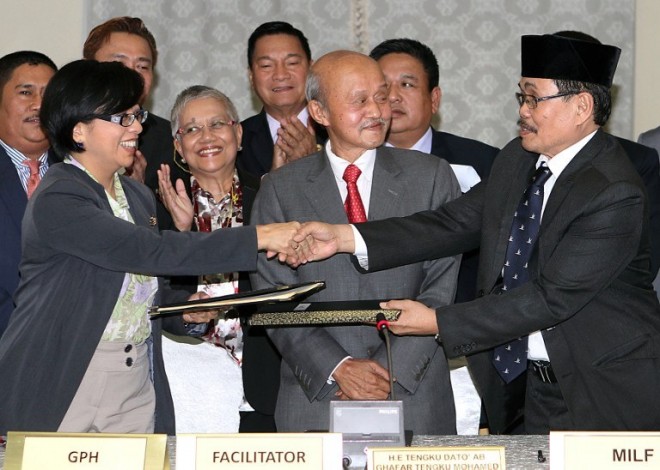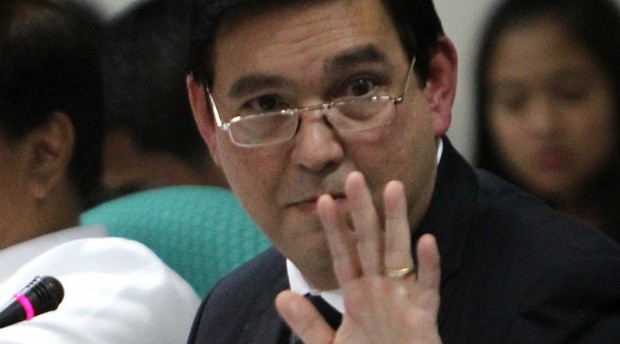Recto: BBL studded with ‘policy landmines’

Miriam Coronel Ferrer (L), chairperson of the government negotiating panel for peace talks with the Moro Islamic Liberation Front (MILF), exchanges documents with MILF Chief Negotiator Mohagher Iqbal (R) during a press conference at a hotel in Kuala Lumpur on January 25, 2014. AFP FILE PHOTO
MANILA, Philippines – Senate Pro Tempore Ralph Recto said the proposed Bangsamoro Basic Law (BBL) should be revised, declaring it was “littered with policy landmines which must be defused.”
“The Senate will not be blackmailed into rubber-stamping the approval of the MILF-drafted proposed Bangsamoro Basic Law as the bill is littered with policy landmines which must be defused,” Recto said in a statement on Monday.
“It cannot pass in its present form. It has to undergo revision and improvements. But amending the bill shouldn’t be equated with mangling it,” he said.
Recto said the BBL must be “cured of its perceived constitutional defects.”
“Dito pa lang ayusin na. It must pass the constitutional litmus test here. It’s better for the legislature to make it constitutionally-compliant than for the Supreme Court to strike it down later,” he said.
Article continues after this advertisementOne “contentious” issue of the BBL, he said, is in the area of “financing the peace.”
Article continues after this advertisement“The BBL is basically an appropriations bill. It creates financial obligations in the tens of billions of pesos. It binds the national government, and ultimately taxpayers, to allocate large sums of money every year,” said the senator.
“On the first year alone of the Bangsamoro establishment, the projected minimum cost is P75 billion,” he said, citing official estimates on the fiscal impact of the creation of the Moro sub-state in Mindanao.
A big chunk of this is in the form of a “block grant,” which in 2016, according to testimonies of government officials, will be around P27 billion, Recto explained.
“In the draft BBL, the block grant is automatically appropriated, meaning Congress is obliged to approve it. It may be open to congressional scrutiny, but not to congressional deletion or even reduction,” he said. “Ang sabi ng marami, parang sovereign debt na natin ito. Kasi nga sa budget natin, ang pambansang utang ay automatically appropriated.”
The BBL, he said, also provides for a “Special Development Fund” which will be remitted by Manila to the Bangsamoro government.
“This is P10 billion, an amount that is bigger than the combined budget of the Tourism (DOT) and Trade and Industry (DTI) departments, or the Technical Education and Skills Development Authority (TESDA),” said the senator.
On top of these entitlements, Recto explained that villages, cities, towns and provinces constituting the Bangsamoro region will continue receiving their Internal Revenue Allotments (IRA), which is the share of local governments from taxes collected by the national government.
Despite the huge allocations, there will be status quo on what national government agencies are spending in the region, said the senator.
“The block grant, the SDF and other entitlements are over and above present spending levels,” he said. “For example, funds for the maintenance of national roads and bridges will still be supplied by the DPWH. Budget of state universities will still come from the pocket of the national government.”
“National agencies will not be pulling the financial plug because the Bangsamoro is already in place. That is clear in the BBL,” Recto further said.
On top of getting “guaranteed aid” from the national government, the Bangsamoro will be able to retain or receive tax payments in the region on a “sharing formula other LGUs can only dream of.”
“Meron ng automatically appropriated funds, tapos they can keep the taxes, in part or in full, of the taxes they can collect,” Recto said.
“Lahat ng taxes on income or goods or services sold in the region, from candies to cars, ang share nila ay 75 percent while the national government gets 25,” he said, “and for the first 10 years, “100% pa non ay fully retained ng Bangsamoro government.”
“If oil will be found in the area, the taxes, fees, royalties will be divided equally. In case of metallic minerals, the Bangsamoro gets three-fourths of the income due to the government, while the national government will have to be content with one-fourth,” the senator added.
Under the proposed measure, Recto said, the Bangsamoro can also impose other taxes, fees, and charges, from which the national government will not receive any.
“And if these are not enough, it can contract loans, chargeable perhaps to the ‘block grant.’ In short, it can pawn future revenues, like what other LGUs are doing,” he said.
Recto said if these revenue-sharing templates will be enjoyed by the Bangsamoro, then LGUs have the right to clamor for the same.
“Kung ibibigay natin sa Bangsamoro, bakit hindi natin ibigay sa Palawan, Cebu, Ilocos or Negros? If this will be precedent-setting, then good, because the principle of fairness and equal application of privileges will be observed,” he said.
“Kasi lalakas ang pressure from local governments na ibigay din sa kanila ang ipinagkaloob sa ilalim ng BBL. Porke ba’t araro lang ang hawak ng isang tao maliit lang ang ibibigay, pero kung baril ang tangan ay malaki?”
Despite this, Recto said he remains a firm supporter of the BBL concept.
“That is a better alternative to war. But my support doesn’t mean that I will have to deposit my independence at the door when discussion or voting time comes,” he said, adding that he would ask the government panel to expound on the “huge financial footprint” of the Bangsamoro project.
RELATED STORIES
